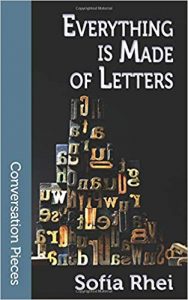SF in Translation in 2019 by Rachel S. Cordasco

In general, speculative fiction in translation (SFT) accounts for a very small fraction of the fiction published in English each year. This past year was no exception: 50 books (novels, collections, and anthologies) and 80 short (standalone) works of SFT made their way to Anglophone readers. While this may not sound like much, it does signify a slow but steady increase in non-Anglophone speculative fiction since the turn of the century. Not since the 1960s and ’70s have we seen such an increase, and while I can’t point to any one factor as an explanation, I imagine that the unprecedented worldwide connectivity brought about by the internet at the end of the last century, coupled with the increase in small and micro-presses and magazines that regularly publish speculative fiction, may offer a partial answer. Perhaps another factor is the growing interest of speculative fiction fans in stories that are written from a non-Anglophone perspective.
While SFT comes to us from many different languages and nations, some continue to dominate year after year (Japanese, French, and Spanish). Japanese SFT made up the largest book-length chunk in 2019 (23.3%), with Chinese (11.6%), and French and German (9.3% each) coming in second and third, respectively. Short fiction, however, was dominated by Spanish (22.5%) stories, followed by Chinese (16.3), and Korean (15%). We can specifically thank Clarkesworld for the steady run of Chinese and Korean short SFT; Samovar and Future Science Fiction Digest, both relatively new publications dedicated to international speculative fiction, have brought us stories translated from the Italian, Russian, Swedish, and Chinese. The Dark Magazine has dedicated itself to regularly publishing Spanish SFT, which can also often be found in the pages of Latin American Literature Today. In fact, SFT can be found in many diverse places, from major presses to major SF magazines and everywhere in between.
 Of the novel-length SFT out in 2019, several texts stand out for their stylistic approaches and fresh takes on such contemporary issues as AI development and the cost of globalization. Chen Qiufan’s Waste Tide (translated by Ken Liu) addresses both of these in an ambitious story about the perils of hazardous e-waste in conjunction with the desperation and poverty fueled by unchecked global trade. Pola Oloixarac’s Dark Constellations (translated by Roy Kesey) similarly explores the dark side of bleeding-edge technology and its interactions with human beings, only here we jump around between continents and centuries. We also have Japanese steampunk à la Blade Runner in Rokuro Inui’s Automatic Eve (translated by Matt Treyvaud) and the last two books in Yoshiki Tanaka’s ten-novel Japanese space opera series Legend of the Galactic Heroes (both translated by Matt Treyvaud). Add in two works of alternate-world fantasies from Israel (Keren Landsman’s The Heart of the Circle, translated from the Hebrew by Daniella Zamir; and The Book of Disappearance by Ibtisam Azem, (translated from the Arabic by Sinan Antoon) and you start to get a better picture of the exciting variety now available to Anglophone readers. And did I mention Rodolfo Martinez’s Sherlock-Holmes-meets-Lovecraft novel The Wisdom of the Dead (translated by the author) or Rodrigo Fresan’s mesmerizing second-in-a-trilogy novel The Dreamed Part (translated by Will Vanderhyden)?
Of the novel-length SFT out in 2019, several texts stand out for their stylistic approaches and fresh takes on such contemporary issues as AI development and the cost of globalization. Chen Qiufan’s Waste Tide (translated by Ken Liu) addresses both of these in an ambitious story about the perils of hazardous e-waste in conjunction with the desperation and poverty fueled by unchecked global trade. Pola Oloixarac’s Dark Constellations (translated by Roy Kesey) similarly explores the dark side of bleeding-edge technology and its interactions with human beings, only here we jump around between continents and centuries. We also have Japanese steampunk à la Blade Runner in Rokuro Inui’s Automatic Eve (translated by Matt Treyvaud) and the last two books in Yoshiki Tanaka’s ten-novel Japanese space opera series Legend of the Galactic Heroes (both translated by Matt Treyvaud). Add in two works of alternate-world fantasies from Israel (Keren Landsman’s The Heart of the Circle, translated from the Hebrew by Daniella Zamir; and The Book of Disappearance by Ibtisam Azem, (translated from the Arabic by Sinan Antoon) and you start to get a better picture of the exciting variety now available to Anglophone readers. And did I mention Rodolfo Martinez’s Sherlock-Holmes-meets-Lovecraft novel The Wisdom of the Dead (translated by the author) or Rodrigo Fresan’s mesmerizing second-in-a-trilogy novel The Dreamed Part (translated by Will Vanderhyden)?
 The 20 SFT collections and anthologies out this past year have brought us stories from underrepresented languages and from authors whose names are quickly becoming familiar to Anglophone readers. Spanish author Sofia Rhei and Argentine author Samanta Schweblin are two of the latter, and their respective collections Rhei’s Everything is Made of Letters (various translators) and Schweblin’s Mouthful of Birds (translated by Megan McDowell) show us how young speculative authors are approaching ideas about language, authoritarianism, surreality in everyday life, and family secrets. Ha Seong-nan’s Flowers of Mold (translated by Janet Hong) also probes the limits of reality by uncovering the uncanny or nightmarish moments in seemingly simple lives. From Croatia and Slovakia came two collections that blend the fabulistic and menacing in mesmerizing new ways; Mars by Asja Bakić (translated by Jennifer Zoble) and The Night Circus and Other Stories by Uršuľa Kovalyk (translated by Julia Sherwood & Peter Sherwood). Anthologies like Broken Stars (Ken Liu’s translation of the most exciting contemporary Chinese SF), The Gollancz Book of South Asian Science Fiction (ed. Tarun Saint, various translators), and Vampiric: Tales of Blood and Roses from Japan (ed. Heather Dubnick, various translators) brought together a fantastic variety of authors (some already well-known to Anglophone readers, others less so) whose stories range from the gritty to the horrifying.
The 20 SFT collections and anthologies out this past year have brought us stories from underrepresented languages and from authors whose names are quickly becoming familiar to Anglophone readers. Spanish author Sofia Rhei and Argentine author Samanta Schweblin are two of the latter, and their respective collections Rhei’s Everything is Made of Letters (various translators) and Schweblin’s Mouthful of Birds (translated by Megan McDowell) show us how young speculative authors are approaching ideas about language, authoritarianism, surreality in everyday life, and family secrets. Ha Seong-nan’s Flowers of Mold (translated by Janet Hong) also probes the limits of reality by uncovering the uncanny or nightmarish moments in seemingly simple lives. From Croatia and Slovakia came two collections that blend the fabulistic and menacing in mesmerizing new ways; Mars by Asja Bakić (translated by Jennifer Zoble) and The Night Circus and Other Stories by Uršuľa Kovalyk (translated by Julia Sherwood & Peter Sherwood). Anthologies like Broken Stars (Ken Liu’s translation of the most exciting contemporary Chinese SF), The Gollancz Book of South Asian Science Fiction (ed. Tarun Saint, various translators), and Vampiric: Tales of Blood and Roses from Japan (ed. Heather Dubnick, various translators) brought together a fantastic variety of authors (some already well-known to Anglophone readers, others less so) whose stories range from the gritty to the horrifying.
The 80 SFT stories published in print and online magazines in 2019 offered us everything from clones bred on a mountaintop (“All Saints Mountain”) to an intact AI system at the heat death of the universe (“The Lord of Rivers”) to deadly dreams (“Morpheus”). A newly discovered story by Stanislaw Lem made its debut in the Polish/English online magazine Przekrój in May, while the three-part Yiddish story “In the Future City of Edenia” (originally written in 1918) made its appearance in In geveb, a journal of Yiddish studies. Translated from the Italian, Croatian, Spanish, Japanese, Dutch, Romanian, Polish, Korean, Portuguese, Indonesian, Russian, Yiddish, Arabic, and Bulgarian, these stories offered us a unique snapshot of the kinds of speculative fiction being written around the world, as well as the increasing numbers of excellent translators who bring these stories into English.
With readers increasingly looking to non-Anglophone authors for new ways to think about space travel, artificial intelligence, apparitions, alternate realities, monsters, aliens, and more, there’s no better time than the present to seek out and read SF in translation.
This and more like it in the February 2020 issue of Locus.
 While you are here, please take a moment to support Locus with a one-time or recurring donation. We rely on reader donations to keep the magazine and site going, and would like to keep the site paywall free, but WE NEED YOUR FINANCIAL SUPPORT to continue quality coverage of the science fiction and fantasy field.
While you are here, please take a moment to support Locus with a one-time or recurring donation. We rely on reader donations to keep the magazine and site going, and would like to keep the site paywall free, but WE NEED YOUR FINANCIAL SUPPORT to continue quality coverage of the science fiction and fantasy field.








¿que tal? ¿reciben cuentos (en inglés) para enviarles? son de mi autoría.
Thanks! Very nice summary!
Years ago Locus had a annual “column” with 1-2 sentence summaries of the most important novels of the year from various non-English speaking countries. Mot of the contributions were “crowd sourced” to fans form those countries. Sadly, this column disappeared. It would be nice to bring it back.